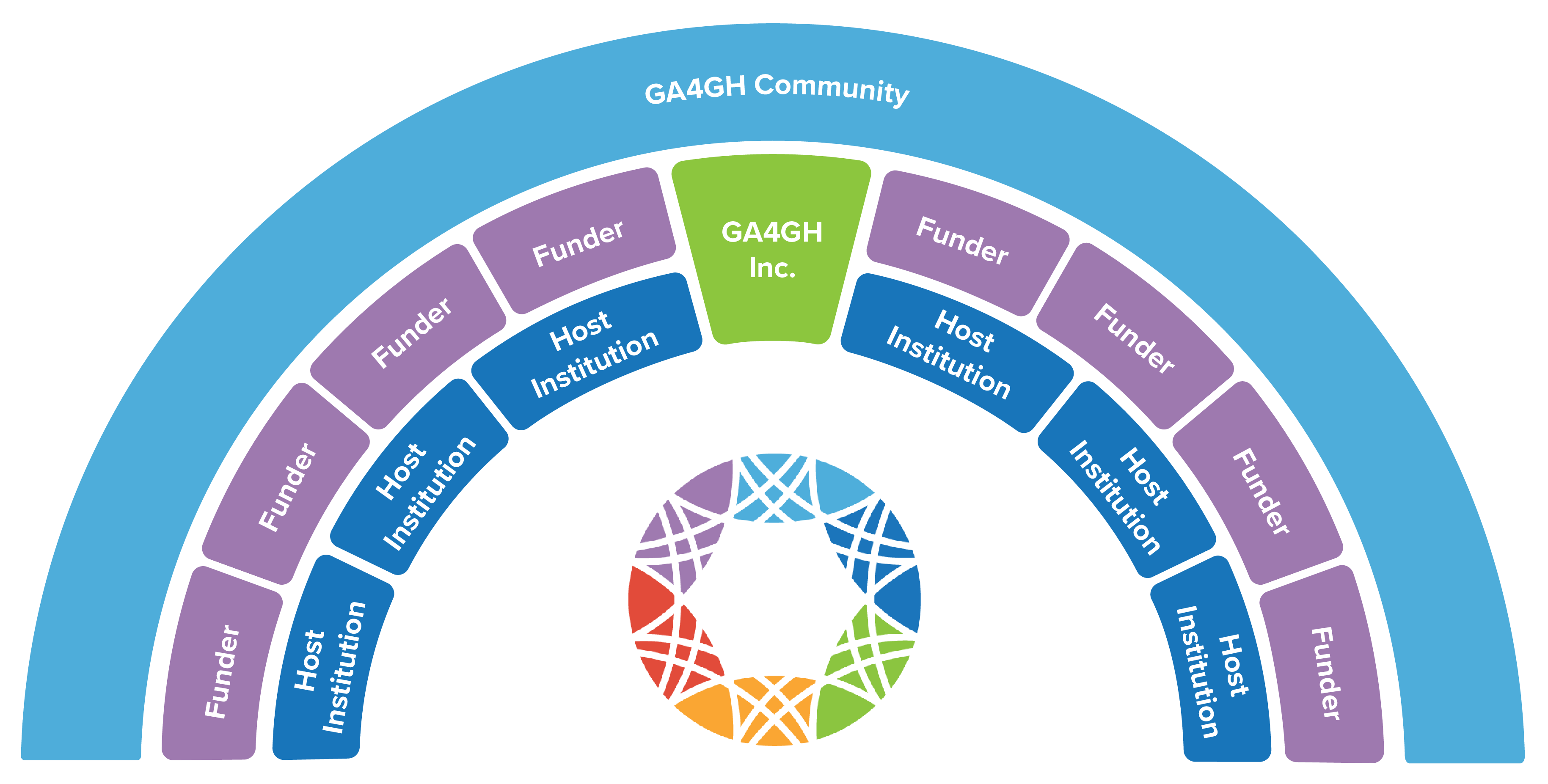About us
Learn how GA4GH helps expand responsible genomic data use to benefit human health.
Learn how GA4GH helps expand responsible genomic data use to benefit human health.
Our Strategic Road Map defines strategies, standards, and policy frameworks to support responsible global use of genomic and related health data.
Discover how a meeting of 50 leaders in genomics and medicine led to an alliance uniting more than 5,000 individuals and organisations to benefit human health.
GA4GH Inc. is a not-for-profit organisation that supports the global GA4GH community.
The GA4GH Council, consisting of the Executive Committee, Strategic Leadership Committee, and Product Steering Committee, guides our collaborative, globe-spanning alliance.
The Funders Forum brings together organisations that offer both financial support and strategic guidance.
The EDI Advisory Group responds to issues raised in the GA4GH community, finding equitable, inclusive ways to build products that benefit diverse groups.
Distributed across a number of Host Institutions, our staff team supports the mission and operations of GA4GH.
Curious who we are? Meet the people and organisations across six continents who make up GA4GH.
More than 500 organisations connected to genomics — in healthcare, research, patient advocacy, industry, and beyond — have signed onto the mission and vision of GA4GH as Organisational Members.
These core Organisational Members are genomic data initiatives that have committed resources to guide GA4GH work and pilot our products.
This subset of Organisational Members whose networks or infrastructure align with GA4GH priorities has made a long-term commitment to engaging with our community.
Local and national organisations assign experts to spend at least 30% of their time building GA4GH products.
Anyone working in genomics and related fields is invited to participate in our inclusive community by creating and using new products.
Wondering what GA4GH does? Learn how we find and overcome challenges to expanding responsible genomic data use for the benefit of human health.
Study Groups define needs. Participants survey the landscape of the genomics and health community and determine whether GA4GH can help.
Work Streams create products. Community members join together to develop technical standards, policy frameworks, and policy tools that overcome hurdles to international genomic data use.
GIF solves problems. Organisations in the forum pilot GA4GH products in real-world situations. Along the way, they troubleshoot products, suggest updates, and flag additional needs.
GIF Projects are community-led initiatives that put GA4GH products into practice in real-world scenarios.
The GIF AMA programme produces events and resources to address implementation questions and challenges.
NIF finds challenges and opportunities in genomics at a global scale. National programmes meet to share best practices, avoid incompatabilities, and help translate genomics into benefits for human health.
Communities of Interest find challenges and opportunities in areas such as rare disease, cancer, and infectious disease. Participants pinpoint real-world problems that would benefit from broad data use.
The Technical Alignment Subcommittee (TASC) supports harmonisation, interoperability, and technical alignment across GA4GH products.
Find out what’s happening with up to the minute meeting schedules for the GA4GH community.
See all our products — always free and open-source. Do you work on cloud genomics, data discovery, user access, data security or regulatory policy and ethics? Need to represent genomic, phenotypic, or clinical data? We’ve got a solution for you.
All GA4GH standards, frameworks, and tools follow the Product Development and Approval Process before being officially adopted.
Learn how other organisations have implemented GA4GH products to solve real-world problems.
Help us transform the future of genomic data use! See how GA4GH can benefit you — whether you’re using our products, writing our standards, subscribing to a newsletter, or more.
Join our community! Explore opportunities to participate in or lead GA4GH activities.
Help create new global standards and frameworks for responsible genomic data use.
Align your organisation with the GA4GH mission and vision.
Want to advance both your career and responsible genomic data sharing at the same time? See our open leadership opportunities.
Join our international team and help us advance genomic data use for the benefit of human health.
Discover current opportunities to engage with GA4GH. Share feedback on our products, apply for volunteer leadership roles, and contribute your expertise to shape the future of genomic data sharing.
Solve real problems by aligning your organisation with the world’s genomics standards. We offer software dvelopers both customisable and out-of-the-box solutions to help you get started.
Learn more about upcoming GA4GH events. See reports and recordings from our past events.
Speak directly to the global genomics and health community while supporting GA4GH strategy.
Be the first to hear about the latest GA4GH products, upcoming meetings, new initiatives, and more.
Questions? We would love to hear from you.
Read news, stories, and insights from the forefront of genomic and clinical data use.
Publishes regular briefs exploring laws and regulations, including data protection laws, that impact genomic and related health data sharing
Translates findings from studies on public attitudes towards genomic data sharing into short blog posts, with a particular focus on policy implications
Attend an upcoming GA4GH event, or view meeting reports from past events.
See new projects, updates, and calls for support from the Work Streams.
Read academic papers coauthored by GA4GH contributors.
Listen to our podcast OmicsXchange, featuring discussions from leaders in the world of genomics, health, and data sharing.
Check out our videos, then subscribe to our YouTube channel for more content.
View the latest GA4GH updates, Genomics and Health News, Implementation Notes, GDPR Briefs, and more.
4 Dec 2020
The Global Alliance for Genomics and Health has announced the launch of GA4GH Inc., a not-for-profit organization incorporated under the federal laws of Canada.

The Global Alliance for Genomics and Health has announced the launch of GA4GH Inc., a not-for-profit organization incorporated under the federal laws of Canada. GA4GH Inc. will serve as a keystone for the Alliance, working alongside existing GA4GH governance structures such as the Standards Steering Committee (SSC), the Strategic Advisory Board (SAB), funders, and Host Institutions, which have supported the organization since its inception in 2013.
The mission of GA4GH is to “accelerate progress in genomic research and human health by cultivating a common framework of standards and harmonized approaches for effective and responsible genomic and health-related data sharing.” The success of this mission depends on a stable organization backed by sustainable funding.
“GA4GH has rapidly established significant commitment and support from the international genomics community,” said Peter Goodhand, CEO of GA4GH. “The not-for-profit will bring new capabilities to the organization, allowing us to meet the community’s ambitious goals and keep pace with the rapidly changing needs of genomic and health data sharing for years to come.”
Following a half decade of steady growth, GA4GH has recently experienced significant momentum in productivity, awareness, and uptake. As evidence of this momentum, the not-for-profit announcement comes alongside several new funding agreements which will support GA4GH over the next five years. This funding will allow the organization to scale operations and technical staff in order to reliably produce and maintain standards and policy frameworks and help secure the long term sustainability of GA4GH as the international standards organization for genomics.
“Thanks to the hard work of an incredibly dedicated contributor community, GA4GH has matured into the preeminent global standards-setting and policy-framing organization for genomic and health-related data sharing,” said Ewan Birney, Deputy Director of EMBL, Director of EMBL-EBI, and Chair of GA4GH. “I am delighted at the opportunity these recent developments present for extending and bolstering those commitments.”

As a legal entity that can hold assets and enter into contracts, the not-for-profit will be able to develop a legal framework that lays out a robust approach to intellectual property, ensures freedom to operate, and maintains the ability to provide open standards. It will also have the ability to enter into binding contractual agreements with existing standards organizations and others and to accept sponsorship funding from private sector entities and potentially disburse funds in pursuit of GA4GH’s purpose.
Initially, GA4GH Inc. will be governed by a Board of Directors that mirrors the current four-person GA4GH Executive Committee. This group will expand by three to seven additional members over the coming year, with new directors being nominated by the SSC, the SAB, and a newly formed “Funder’s Forum,” which consists of funders that have committed at least US$200,000 per year for a minimum of five years.
The new funding agreements will more than double the GA4GH core staff, including the addition of a Chief Standards Officer to be based at EMBL-EBI who will oversee a team of six developers distributed across the US, the UK, and Canada. The funding will also support an international secondment programme to build capacity in lower and middle income countries, as well as other activities to bolster the international community’s ability to meaningfully engage with GA4GH.
